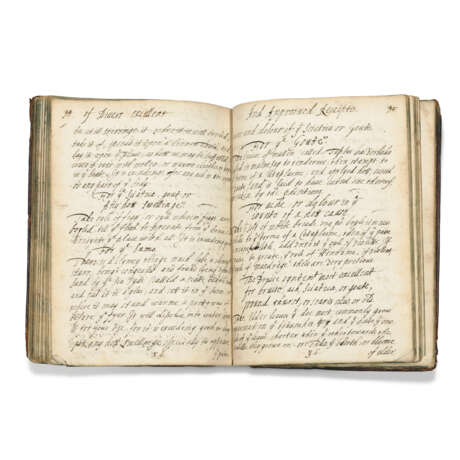ID 794442
Lot 44 | Anonymous authors
Estimate value
£ 3 000 – 5 000
Book of divers excellent and sondry Receipts, very usefull, and most approoved, a receipt book for household medical use, manuscript on paper [England, chiefly 17th C]
An eclectic collection of domestic remedies for a host of ailments which might have afflicted a 17th-century English household, from ‘paine of the backe’ to the plague, making use of common and less-common ingredients, ranging from medicinal herbs to crushed snails’ shells, dog dung, and liquefied jellyfish.
c.195 x 145mm, 196 written pages, the text divided into two books, paginated in two sequences, c.22 lines per page (occasional marginal staining and some offsetting of the text). Calf-backed boards (some loss to lower portion of spine, binding worn with losses to leather, lacking clasps, scored and nicked throughout, edges and corners bumped with losses).
Content: Instructions for the preparation of medical remedies for a variety of illnesses and common ailments, including: toothache, which is to be treated with burnt broom stalks; itchy or bloodshot eyes, for which the blood of doves is applied to the eyes using a cloth; 'inflammation of the Codds, or privy Partes’, soothed with a poultice of leeks and hogs’ grease; prevention of the plague, using a blend of cinnamon, cloves, and aloe; and a mixture of dog dung and snails for quinsy [the infection caused by tonsilitis].
Meticulously ordered and comprising two books, each with an accompanying table of contents, this manuscript contains remedies for more than ninety illnesses. Further material added at the end of the manuscript includes a recipe in another hand for ‘Matthius Lucantelloes his pressious Ballsome’; Lucantello was a mountebank who was ordered to cease practising as a doctor in 1640 by the Royal College of Physicians. The inclusion of his recipe – and of many other questionable remedies – renders this book of receipts a fascinating textual repository for domestic medical knowledge which might otherwise have circulated primarily by word of mouth. To the final pages are added contributions in 18th-century hands: an additional recipe, a verse of a song, and a riddle.
Special notice
No VAT on hammer price or buyer's premium.
| Place of origin: | Northern Europe, Europe, United Kingdom |
|---|---|
| Auction house category: | Letters, documents and manuscripts, Medicine & science |
| Place of origin: | Northern Europe, Europe, United Kingdom |
|---|---|
| Auction house category: | Letters, documents and manuscripts, Medicine & science |
| Address of auction |
CHRISTIE'S 8 King Street, St. James's SW1Y 6QT London United Kingdom | |
|---|---|---|
| Preview |
| |
| Phone | +44 (0)20 7839 9060 | |
| Buyer Premium | see on Website | |
| Conditions of purchase | Conditions of purchase |





